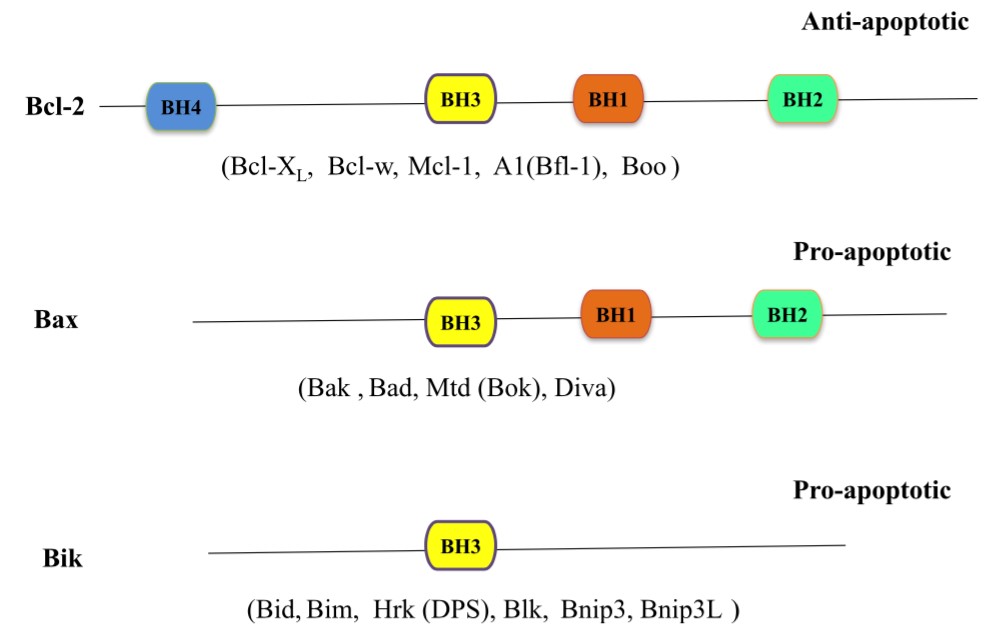Mempro™ Cell-Based Bcl-2 Inhibitors of Programmed Cell Death Production
Creative Biostructure provides custom Mempro™ Bcl-2 inhibitors of programmed cell death production services using cell-based expression system.
Mempro™ cell-based protein production system is widely used for the production of integral membrane proteins. B-cell lymphoma 2 (Bcl-2), an apoptosis (cell death) regulator, is encoded in mankinds by the BCL2 gene. It is well known that Bcl-2 is a crucial anti-apoptotic protein and is thus classified as an oncogene. Bcl-2 family can be divided into two classes of proteins, including pro-death proteins and pro-survival proteins. The pro-death proteins include BCL-2-associated X protein (BAX), BCL-2 antagonist/killer 1 (BAK), BCL-2-associated agonist of cell death (BAD), BCL-2-like 11 (BIM), NOXA, and BCL-2 binding component 3 (PUMA), whereas the pro-survival proteins include BCL-2, BCL-XL, BCL-2-like 2 (BCL-w), myeloid cell leukemia sequence 1 (MCL-1), and BCL-2-related protein A1 (BFL-1). Notably, Members of Bcl-2 inhibitors of programmed cell death superfamily can interact in an inhibitory manner with BCL-2, BCL-XL, and BCL-w. Therefore, Bcl-2 inhibitors of programmed cell death play an important role in clinical development.
 Figure 1. The structures of Bcl-2 family proteins. (J. Hematol. Oncol., 2015)
Figure 1. The structures of Bcl-2 family proteins. (J. Hematol. Oncol., 2015)
Creative Biostructure can produce high-yield Bcl-2 inhibitors using cell-based protein expression system, we can perform various strategies for Mempro™ cell-based protein production, including:
- Mempro™ Protein Production in Bacterial Cells System ;
- Mempro™ Protein Production in Yeast Cells System;
- Mempro™ Protein Production in Incest Cells System;
- Mempro™ Protein Production in Mammalian Cells System.
Commercial Escherichia coli (E. coli) is the most commonly employed bacterial host for the production of Bcl-2 inhibitors. Yeast cells (such as saccharomyces cerevisiae and pichia pastoris) system, combines prokaryotic as well as eukaryotic characteristics. It is a powerful eukaryotic host due to single cells, fast growth rates, inexpensive media, high cell densities. Insect cells (such as Sf9, Sf21 and High Five) are also the major system for Bcl-2 inhibitors expression, which are developed from transfected insect cells in combination with vectors derived from the baculovirus species AcMNPV. Mammalian cells present another eukaryotic system for Bcl-2 inhibitors expression, which provide near-native cell environment. Cell lines derived from COS, CHO, BHK-21, HEK293, HeLa and GH3 can be widely used for membrane protein expression.
With the Mempro™ cell-based protein production platform, Creative Biostructure is capable of expressing, isolating, purifying and crystallizing Bcl-2 inhibitors to facilitate the study of their physiological functions.
We provide other various Mempro™ membrane protein production services. Please feel free to contact us for a detailed quote.
References:
C. Trometer, and P. Falson (2010). Mammalian membrane protein expression in baculovirus-infected insect cells. Methods Mol. Biol., 601: 105-117.
F. Junge, et al. (2008) Large-scale production of functional membrane proteins. Cellular Mol. Life Sci., 65 (11): 1729-1755.
J. Petschnigg, et al. (2011). Using yeast as a model to study membrane proteins. Curr. Opin. Nephrol. Hypertens., 20(4): 425-432.
S. Cang, et al. (2015). ABT-199 (venetoclax) and BCL-2 inhibitors in clinical development. J. Hematol. Oncol., 8: 129.
S. Schlegel, et al. (2013). Bacterial-based membrane protein production. Biochim. Biophys. Acta., 1843(8): 1739-1749.